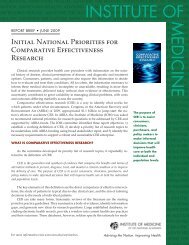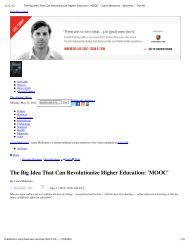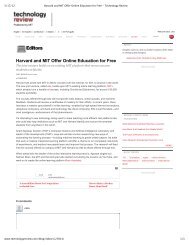You also want an ePaper? Increase the reach of your titles
YUMPU automatically turns print PDFs into web optimized ePapers that Google loves.
that if the price <strong>of</strong> oil were to decline, then fiscal probity<br />
would be thrown into question. The government would<br />
then face a choice <strong>of</strong> fiscal contraction, which would have<br />
a negative impact on GDP growth, or continued borrowing<br />
and spending. Given that the currently high price <strong>of</strong> oil is<br />
largely related to a political risk premium, the possibility <strong>of</strong><br />
a drop in the price cannot be dismissed.<br />
Fourth, capital flight remains a problem and reflects<br />
a dearth <strong>of</strong> confidence in Russia’s immediate future.<br />
Capital flight diminishes business investment from what it<br />
otherwise would be. Interestingly, capital flight is taking<br />
place at the same time that foreign direct investment is<br />
increasing. The latter reflects increased investment in the<br />
energy sector, especially as the government has lately<br />
taken a more open attitude toward foreign involvement in<br />
energy development. Despite capital flight, the currency<br />
recently rose in value, reflecting the rise in oil prices.<br />
Longer term issues<br />
Vladimir Putin was recently elected president for the third<br />
time, replacing outgoing President Medvedev. He will now<br />
serve a six-year term. His margin <strong>of</strong> victory was substantial<br />
and, therefore, sufficient to quash skepticism. Although<br />
Russia<br />
we know who will lead Russia, the policy regime remains<br />
somewhat murky. It is not known whether Mr. Putin will<br />
move toward market orientation or support a more statist<br />
set <strong>of</strong> policies.<br />
Notably, Mr. Putin has cited China and South Korea as<br />
examples <strong>of</strong> favorable growth environments. China, in<br />
particular, has relied heavily on state direction <strong>of</strong> the<br />
economy, while South Korea relied on state protection <strong>of</strong><br />
favored industries in the early stages <strong>of</strong> its industrial development.<br />
As such, Putin’s comments suggest a good deal<br />
<strong>of</strong> government involvement in economic management.<br />
On the other hand, Russia is set to join the World Trade<br />
Organization (WTO) this year. Membership will require<br />
more openness on trade-related issues.<br />
The most pressing challenge that Mr. Putin will face in the<br />
coming years is the level <strong>of</strong> investment as a share <strong>of</strong> GDP.<br />
Currently, it is inadequate for generating strong growth.<br />
Moreover, the level <strong>of</strong> investment in the energy industry,<br />
while rising, remains insufficient to substantially boost<br />
production. Boosting investment, in part by generating<br />
more foreign direct investment, will be critical.<br />
Geographies<br />
35











